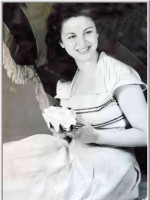Farid Shawki is a Actor Egyptien born on 30 july 1920 at Cairo (Egypte)
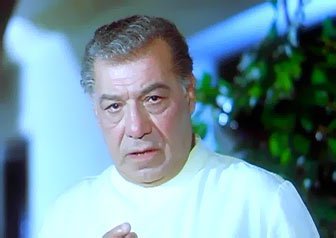
Farid Shawqi Mohammad Abduh Badawi (Arabic: فريد شوقي محمد عبده بدوي) (July 30, 1920 in Cairo - July 27, 1998) known as Farid Shawqi (Arabic: فريد شوقي ) was an Egyptian actor, screenwriter and film producer. He acted in 361 films, 12 plays and 12 television series; wrote 22 film scripts; and produced 26 films.
He was also known as Malek El Terso ("The King of the Third Class" - a reference to his popularity among the poor, who bought third-class seats in movie theatres), as "Wahsh Ash shashah Al Arabiyah the Monster of the Arab Silver Screen" in honor of his various roles of beloved hero, as Farid Bay ("Sir Farid", an informal title of respect), and as Abu el-Banat ("father of all girls", a reference to his having five daughters and no sons).
In a career spanning almost 50 years, Shawqi starred, produced, or wrote the scenario of over 400 films - more than the films produced collectively by the whole Arab world - in addition to theatre, television and video plays. His popularity covered the whole of the Arab World, including Turkey where he acted in some films there, and directors always addressed his as ' Farid Bay' (Sir Farid) as a sign of respect. As he worked with over 90 Film directors and producers.
For the first ten years he typically cast as a villain. By the late 1940s his name alongside that of the late Mahmoud el-Mileegy guaranteed a box-office success. In 1950 he changed that image forever, playing the leading role in Ga'aloony Mujriman ("They Made Me a Criminal"), his own script in which he tackled the problem of homeless children and the first crime thus exposing the failure of government policy and the corruption of state run orphanages and young offenders institutions.
Disliked by the establishment, the film was later awarded the State Prize; Shawqi went on to collect 10 best actor awards in many festivals, and four other awards for his scripts in the next thirty years.
Critics referred to him as the "John Wayne" or "Anthony Quinn" of Egyptian cinema and of the Arabic speaking World", and to the masses he was the Beast of the Silver Screen, who championed the underdog, especially women, and the dispossessed using an effective mixture of cunning, physical strength, personal charm, and unbending principles, to overcome the wicked aggressors. With an illiteracy of over 80 per cent at the time, the "Screen Beast" personified the masses' dreams of defeating the wealthy, who were above the law thanks to an unjust class system.
Screenwriter Abd-el-Hay Adeeb once had to rewrite a scene in a film after it had been released: Shawqi's character was slapped on the back of the neck, which is a sign of contempt in southern Mediterranean countries; the cinema audience in the city of Assiut rioted in protest, destroying the building.
In 1969, Youssef Chahine's film al-Ardh ("The Land") ended with the main character being dragged to his death behind the horse of a corrupt police officer. Audiences called for the "Beast" - Shawqi - to come to his rescue, despite the fact that Shawqi did not appear in that film.
A number of critics spent a great deal of time discussing the phenomenon as it was clear that Shawqi lived in the psyche of the nation as an image greater than reality and he represented hope and implementation of justice during the totalitarian military rule in the 1950s and 60's. With the influence of Egyptian cinema on the whole of the Middle East, the "Beast of the Silver Screen" had a similar status in all Arabic-speaking nations, where the main entertainment was, and still to a large degree, Egyptian films.
Film producers and financiers called Shawqi - Malek el-Terso - or the King of the Third Class (Terso is an Egyptian slang word derived from the Italian word referring to the cheap third class seats in the cinema from which the bulk of the box office takings came). Shawqi was born in July 1920 in El Baghghala neighborhood of Cairo's popular quarter of Al-Sayyedah Zynab, where the majority of residents were the terso- film goers when Egyptian cinema started turning into a big industry. Shawqi worked as a civil servant as the Second World War broke out. He was given small parts in Ramsis Theatre group headed by Youssef Bay Wahby, then he worked with Anwar Wagdy doing small parts on the silver screen. He also formed a local theatre group `The National League of Acting' which included his young wife actress Zainab Abd-el-Hady whom he married in 1941, they had one daughter Mona. They were divorced four years later, when he married his second wife, dancer Saneya Shawqi, whom he also divorced in 1950.
By 1943 the NLA became The 20 Theatre as the members grew to 20 all became household names in Egyptian theatre and cinema for decades to come.
The group specialized in presenting Chekov's plays, and Shawqi excelled in playing the leading parts - later on he loved to play classic parts in screenplays of novels by Nobel Prize holder Naguib Mahfouz. One of them was playing the role of Sultan in the film Bidaya wa nihaya.
With success in theatre, and small parts in films, Shawqi left his post at the civil service in 1946. Few months later the 20 Theatre became the nucleus of the Higher Institute of Drama. In 1947 he made his mark in the film “Mala’eka Fi Gohanam” ` Angels in Hell'. With his third wife, singer and actress Huda Sultan, whom he married in 1951, they made a famous partnership in more than 80 films. The marriage lasted 18 years and produced two daughters Maha and Nahed who is a successful film producer in her own right. He was working on a script for his daughter in film dealing with homeless young people just before he died.
In 1970, he married Soheir Turk, they stayed together until he died, she also gave him two daughters Rania and Abir.
He was survived by wife Soheir Turk and five daughters Mona, Nahed, Maha, Rania and Abir. His brother was the late General Staff of Egyptian Army Ahmad Shawqi. Farid's youngest daughter, Rania, is a well known actress. She has two children from husband Atef Awad, Fareeda and Malak. His other daughter from Soheir, Abir, is a film director with two children as well.
Il s'est mariée quatre fois
Source : Wikidata
Farid Shawki

- Infos
- Photos
- Best films
- Family
- Characters
- Awards
Birth name Farid Shawki ( فريد شوقي)
Nationality Egypte
Birth 30 july 1920 at Cairo (Egypte)
Death 27 july 1998 (at 77 years) at Cairo (Egypte)
Nationality Egypte
Birth 30 july 1920 at Cairo (Egypte)
Death 27 july 1998 (at 77 years) at Cairo (Egypte)
He was also known as Malek El Terso ("The King of the Third Class" - a reference to his popularity among the poor, who bought third-class seats in movie theatres), as "Wahsh Ash shashah Al Arabiyah the Monster of the Arab Silver Screen" in honor of his various roles of beloved hero, as Farid Bay ("Sir Farid", an informal title of respect), and as Abu el-Banat ("father of all girls", a reference to his having five daughters and no sons).
In a career spanning almost 50 years, Shawqi starred, produced, or wrote the scenario of over 400 films - more than the films produced collectively by the whole Arab world - in addition to theatre, television and video plays. His popularity covered the whole of the Arab World, including Turkey where he acted in some films there, and directors always addressed his as ' Farid Bay' (Sir Farid) as a sign of respect. As he worked with over 90 Film directors and producers.
For the first ten years he typically cast as a villain. By the late 1940s his name alongside that of the late Mahmoud el-Mileegy guaranteed a box-office success. In 1950 he changed that image forever, playing the leading role in Ga'aloony Mujriman ("They Made Me a Criminal"), his own script in which he tackled the problem of homeless children and the first crime thus exposing the failure of government policy and the corruption of state run orphanages and young offenders institutions.
Disliked by the establishment, the film was later awarded the State Prize; Shawqi went on to collect 10 best actor awards in many festivals, and four other awards for his scripts in the next thirty years.
Critics referred to him as the "John Wayne" or "Anthony Quinn" of Egyptian cinema and of the Arabic speaking World", and to the masses he was the Beast of the Silver Screen, who championed the underdog, especially women, and the dispossessed using an effective mixture of cunning, physical strength, personal charm, and unbending principles, to overcome the wicked aggressors. With an illiteracy of over 80 per cent at the time, the "Screen Beast" personified the masses' dreams of defeating the wealthy, who were above the law thanks to an unjust class system.
Screenwriter Abd-el-Hay Adeeb once had to rewrite a scene in a film after it had been released: Shawqi's character was slapped on the back of the neck, which is a sign of contempt in southern Mediterranean countries; the cinema audience in the city of Assiut rioted in protest, destroying the building.
In 1969, Youssef Chahine's film al-Ardh ("The Land") ended with the main character being dragged to his death behind the horse of a corrupt police officer. Audiences called for the "Beast" - Shawqi - to come to his rescue, despite the fact that Shawqi did not appear in that film.
A number of critics spent a great deal of time discussing the phenomenon as it was clear that Shawqi lived in the psyche of the nation as an image greater than reality and he represented hope and implementation of justice during the totalitarian military rule in the 1950s and 60's. With the influence of Egyptian cinema on the whole of the Middle East, the "Beast of the Silver Screen" had a similar status in all Arabic-speaking nations, where the main entertainment was, and still to a large degree, Egyptian films.
Film producers and financiers called Shawqi - Malek el-Terso - or the King of the Third Class (Terso is an Egyptian slang word derived from the Italian word referring to the cheap third class seats in the cinema from which the bulk of the box office takings came). Shawqi was born in July 1920 in El Baghghala neighborhood of Cairo's popular quarter of Al-Sayyedah Zynab, where the majority of residents were the terso- film goers when Egyptian cinema started turning into a big industry. Shawqi worked as a civil servant as the Second World War broke out. He was given small parts in Ramsis Theatre group headed by Youssef Bay Wahby, then he worked with Anwar Wagdy doing small parts on the silver screen. He also formed a local theatre group `The National League of Acting' which included his young wife actress Zainab Abd-el-Hady whom he married in 1941, they had one daughter Mona. They were divorced four years later, when he married his second wife, dancer Saneya Shawqi, whom he also divorced in 1950.
By 1943 the NLA became The 20 Theatre as the members grew to 20 all became household names in Egyptian theatre and cinema for decades to come.
The group specialized in presenting Chekov's plays, and Shawqi excelled in playing the leading parts - later on he loved to play classic parts in screenplays of novels by Nobel Prize holder Naguib Mahfouz. One of them was playing the role of Sultan in the film Bidaya wa nihaya.
With success in theatre, and small parts in films, Shawqi left his post at the civil service in 1946. Few months later the 20 Theatre became the nucleus of the Higher Institute of Drama. In 1947 he made his mark in the film “Mala’eka Fi Gohanam” ` Angels in Hell'. With his third wife, singer and actress Huda Sultan, whom he married in 1951, they made a famous partnership in more than 80 films. The marriage lasted 18 years and produced two daughters Maha and Nahed who is a successful film producer in her own right. He was working on a script for his daughter in film dealing with homeless young people just before he died.
In 1970, he married Soheir Turk, they stayed together until he died, she also gave him two daughters Rania and Abir.
He was survived by wife Soheir Turk and five daughters Mona, Nahed, Maha, Rania and Abir. His brother was the late General Staff of Egyptian Army Ahmad Shawqi. Farid's youngest daughter, Rania, is a well known actress. She has two children from husband Atef Awad, Fareeda and Malak. His other daughter from Soheir, Abir, is a film director with two children as well.
Biography
Le père de Farid Chawki, d'origine turc, s'installe au Caire. Farid, enfant passionné de cinéma, est diplômé de l'École d'interprétation du Caire qu'il intègre après avoir obtenu le baccalauréat. Il suit également les cours de l' Institut d’arpentage et d’ingénierie, qui lui permettront d'exercer une première activité professionnelle. Il intègre la troupe du théâtre national à Alexandrie. Par ses interprétations tant au théâtre qu'au cinéma Farid Chawki est un comédien très populaire tant en Égypte qu'en Turquie.Il s'est mariée quatre fois
Usually with
Filmography of Farid Shawki (11 films)
Actor
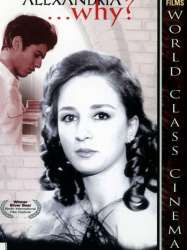
Alexandria… Why? (1979)
, 2h13Directed by Youssef Chahine
Genres Drama, War
Themes Films about sexuality, LGBT-related films, LGBT-related films, LGBT-related film
Actors Ahmed Zaki, Mahmoud el-Meliguy, Youssef Wahbi, Gerry Sundquist, Naglaa Fathi, Yehia Chahine
Roles Mohsen's Father (as Farid Chawky)
Rating71%





Le film entrecroise plusieurs histoires en 1942, à Alexandrie, peu avant la bataille d'El-Alamein. Un étudiant de cinéma rêve de partir travailler à Hollywood, un militaire se découvre sentimental…
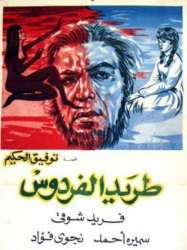
Driven from Paradise (1965)
, 1h40Directed by Fatin Abdel Wahab
Genres Drama, Comedy, Fantasy
Actors Farid Shawki, Poussi
Rating23%






Wa Islamah (1961)
, 1h37Directed by Andrew Marton
Genres Drama, War, Historical
Actors Ahmed Mazhar, Rushdy Abaza, Lobna Abdel Aziz, Emad Hamdy, Tahia Carioca, Mahmoud el-Meliguy
Roles Bltai
Rating64%






The Beginning and the End (1960)
Directed by Salah Abou Seif, Salah Abou-Sayf
Genres Drama
Actors Omar Sharif, Sanaa Gamil, Amina Rizk, Salah Mansour, Farid Shawki
Roles Sultan
Rating78%





The film portrays the lives of the members of an Egyptian family, who are three brothers, their sister Nefisah (Sanaa Gamil) and their mother (Amina Rizk), after the family's patriarch's death.

Cairo Station (1958)
, 1h30Directed by Youssef Chahine
Origin Egypte
Genres Drama, Thriller, Crime
Themes Transport films, Rail transport films
Actors Youssef Chahine, Farid Shawki, Hind Rostom
Roles Abu Siri (أبو سريع ʿAbū Sirīʿ)
Rating74%





A newsstand owner takes pity on Qinawi, a lame young man, and gives him a job selling newspapers in the Cairo train station. The women there all shun him because of his mild handicap, though he has little trouble walking.

The Thug (1957)
Directed by Salah Abou Seif, Salah Abou-Sayf
Genres Drama
Actors Farid Shawki, Tahia Carioca, Zaki Rostom زكي رستم, Mahmoud el-Meliguy
Rating72%





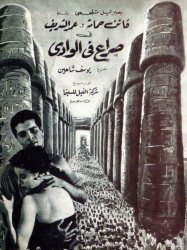
The Blazing Sun (1954)
, 1h45Directed by Youssef Chahine
Origin Egypte
Genres Drama, Crime, Romance
Actors Faten Hamama, Omar Sharif, Zaki Rostom زكي رستم, Farid Shawki
Rating71%





Omar Sharif plays Ahmed, an engineer whose father (played by Abdel Waress Assar) is a farmer and a farm owner. His father succeeds in improving and increasing the production of sugar cane in his farm. Taher Pasha, a wealthy land owner, who runs a competing sugar cane production facility, feels threatened by his recent production prosperity. Ahmed is in a love relationship with the pasha's daughter, Amal, but as a consequence to the rivalry between both their fathers, he is compelled to hide their relationship.
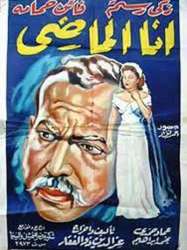
I Am the Past (1950)
, 2h5Directed by Ezzel Dine Zulficar
Genres Drama, Thriller, Horror
Actors Faten Hamama, Emad Hamdy, Zaki Rostom زكي رستم, Negma Ibrahim, Farid Shawki
Rating63%





Hamed is released from prison after serving 20 years for a crime he did not commit. The crime was the murder of his close friend, Kamel. Kamel's murder was the result of an affair that his wife, Elham, was having with another man, Fareed, who was the murderer. Elham covered up for her lover's murder and Hamed was falsely jailed for the murder.
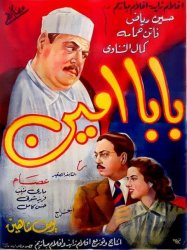
Baba Amin (1950)
, 1h50Directed by Youssef Chahine
Origin Egypte
Genres Drama, Comedy, Musical theatre
Themes Films about music and musicians, Musical films
Actors Faten Hamama, Kamal el-Shennawi, Farid Shawki, Hind Rostom
Roles Rachdi
Rating64%





Papa Amin est riche, mais avare. Un cauchemar le poursuit : quelle sera la situation de sa petite famille après sa mort ? Il prête, à l'insu de sa famille, ses économies à un douteux homme d'affaires, Mabrouk.

The Flirtation of Girls (1949)
Directed by Anwar Wagdi
Genres Comedy, Romantic comedy, Musical, Romance
Themes Musical films
Actors Naguib el-Rihani, Layla Murad, Farid Shawki, Anwar Wagdi, Mahmoud el-Meliguy, Youssef Wahbi
Rating75%





Laila, daughter of the wealthy Mourad Pasha, can't pass her exams in the Arabic language, and seeks the help of a tutor. Marzouk Afandy, who works for the Pasha, brings Mr. Hamam to help her with her studies.

Malak alrahma (1946)
Directed by Youssef Wahbi
Genres Drama
Actors Faten Hamama, Negma Ibrahim, Farid Shawki, Seraj Munir, Youssef Wahbi, Bishara Wakim بشارة واكيم
Roles Zaki.
Rating70%





Fouad Bek is married to Imtethal and has a daughter, Thoraya, who lives in Istanbul with her grandparents. Before Imtethal's mother dies, she reveals a secret she has been keeping to her daughter. She also has a son out of wedlock, and tells her where he is. Imtehal meets her brother, Zaki, who tries to trick her and steal from her. He even threatens her with letters. One day, Fouad finds a letter from Zaki. He misunderstands what the letter discloses and thinks that his wife is having an affair with this man. Thoraya returns to Egypt and finds that her parents have divorced.
 Connection
Connection


